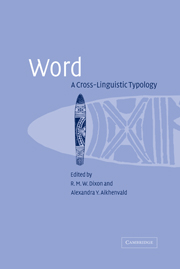Book contents
- Frontmatter
- Contents
- List of contributors
- Preface
- List of abbreviations
- 1 Word: a typological framework
- 2 Typological parameters for the study of clitics, with special reference to Tariana
- 3 The word in Cup'ik
- 4 The word in Eastern/Central Arrernte
- 5 The eclectic morphology of Jarawara, and the status of word
- 6 Towards a notion of ‘word’ in sign languages
- 7 Synchronic and diachronic perspective on ‘word’ in Siouan
- 8 What is a word in Dagbani?
- 9 The word in Georgian
- 10 The word in Modern Greek
- 11 What can we conclude?
- Index of authors
- Index of languages and language families
- Index of subjects
- References
9 - The word in Georgian
Published online by Cambridge University Press: 22 September 2009
- Frontmatter
- Contents
- List of contributors
- Preface
- List of abbreviations
- 1 Word: a typological framework
- 2 Typological parameters for the study of clitics, with special reference to Tariana
- 3 The word in Cup'ik
- 4 The word in Eastern/Central Arrernte
- 5 The eclectic morphology of Jarawara, and the status of word
- 6 Towards a notion of ‘word’ in sign languages
- 7 Synchronic and diachronic perspective on ‘word’ in Siouan
- 8 What is a word in Dagbani?
- 9 The word in Georgian
- 10 The word in Modern Greek
- 11 What can we conclude?
- Index of authors
- Index of languages and language families
- Index of subjects
- References
Summary
Georgian is a language of the Kartvelian (South Caucasian) language family; this family appears to be unrelated to North East Caucasian and North West Caucasian language families. Georgian is spoken by some five million speakers in the Republic of Georgia, formerly part of the USSR, but now independent.
The notion ‘word’ (Georgian sit'q'va) is very much recognised in Georgian culture. The society is deeply literary, with the Georgian alphabet having been invented in the fourth or fifth century AD, and with texts dating from that time. Georgians have strong intuitions about what is a word, and this corresponds to orthographic practice, with few exceptions.
Summary of the typology
Like other languages of the Caucasus, Georgian has a large number of consonants (twenty-eight) and a modest number of vowels (five). Georgian is famous for its consonant clusters, which may contain up to seven consonants, e.g. mc'vrtneli ‘trainer’, vprckvni ‘I peel it’; clusters are not punctuated by epenthetic vowels. Traditional work in Georgian has identified so-called harmonic consonant clusters, which are characterised by (a) shared laryngeal properties (roughly, all voiceless, all voiced or all ejectives), (b) a structure in which each successive consonant is articulated further back in the mouth (e.g. pt, pk, tk are harmonic clusters, but kp and tp, while allowed, are not harmonic) and (c) a first segment that is a stop or affricate and a second that is a stop, affricate or fricative; see Vogt (1958) and Mač'avariani (1965).
- Type
- Chapter
- Information
- WordA Cross-linguistic Typology, pp. 227 - 242Publisher: Cambridge University PressPrint publication year: 2003



